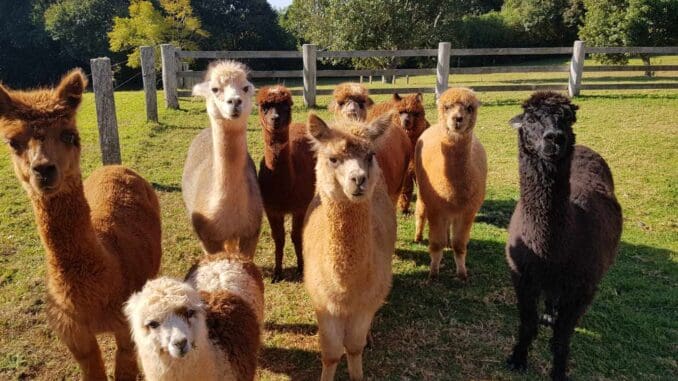
They’re cute, in a quirky way, and certainly cuddly, but also notorious for spitting.
However, for almost five years Jodi Meynell has been breeding gentle-natured animals for therapy, guaranteed not to spit.
“When I first purchased alpacas, I found most breeders weren’t breeding for temperament but for the fleece value,” Jodi explained.
“I was looking for alpacas that could be more easily handled. When I found others were looking for that I decided to specifically breed for temperament.”
Jodi started out with four as a “fancy lawnmower” for her five acres after investigating their benefits.
“Alpacas are gentle on the land. Being in the camelid family, they are very efficient with their food and water, so an easy animal to care for and their soft padded feet are also easy on the land, unlike hooved animals,” she said.
“They are intelligent, inquisitive animals and like to be a part of what you are doing when they are around you.”
Jodi was also familiar with their use as a therapy animal due to their calming nature.
“I was approached by someone who ran day camps for children with physical and intellectual disabilities at a farm retreat who said she’d looked all over Queensland for calm alpacas,” Jodi said.
After seeking advice from a retiring breeder, she began implementing the two-year training required to sell them as therapy animals.
Training begins from birth with lots of handling to desensitise them.
Once they are weaned at six months, halter training begins and they are taught to walk through doorways, buildings and traffic and large groups of people and loud children with erratic movements.
The only thing she’s had to miss in their training schedule is going into an elevator, because of course we don’t have any on the mountain.
Letting go of them to their new owners at the age of two is an emotional experience for Jodi but she takes comfort in knowing they will be valued and loved.
“It’s very rewarding. I keep in contact with them and it’s nice to see who they are interacting with and the joy on the faces of the participants,” she shared.
“The alpacas love the children. It’s like they have a knowledge that they are needed and enjoy helping the children.”
Her herd of four has now grown to 14 and she has four young ones coming through this year’s training program.
Jodi also runs free workshops on alpaca handling.



